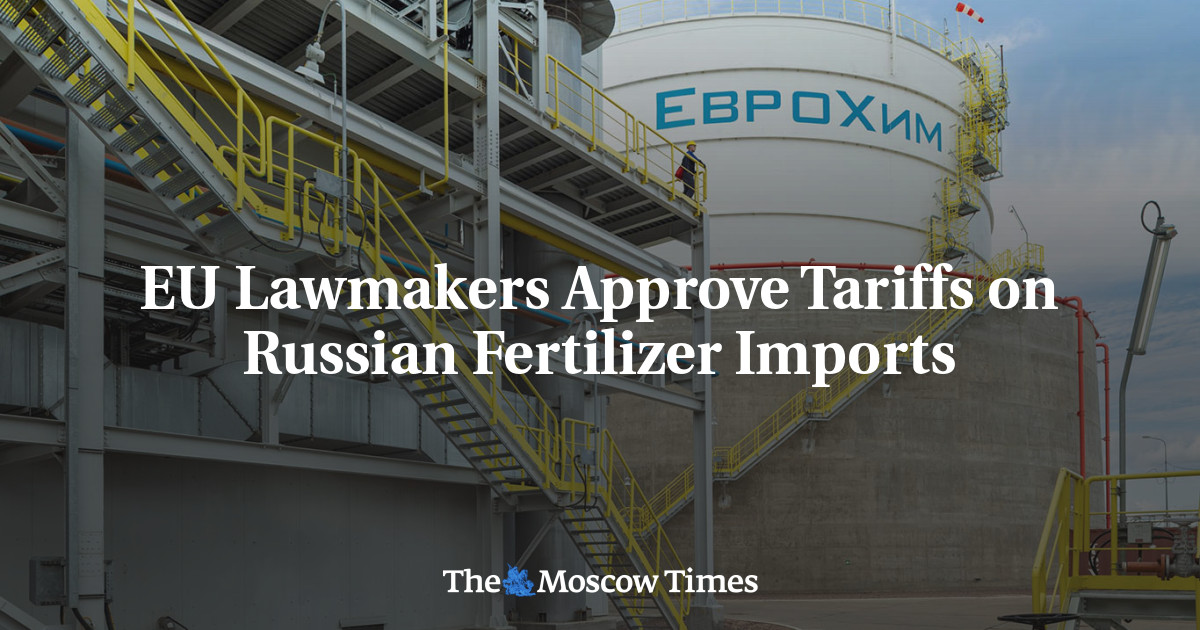
EU Lawmakers Approve Tariffs on Russian Fertilizer Imports
How did your country report this? Share your view in the comments.
Diverging Reports Breakdown
EU Lawmakers Approve Tariffs on Russian Fertilizer Imports
More than a quarter of the EU’s nitrogen-based fertilizer imports currently come from Russia. The European Commission wants to end that dependence. The legislation still requires formal approval from EU member states. But farming groups warn the tariffs could lead to a spike in production costs.
More than a quarter of the EU’s nitrogen-based fertilizer imports currently come from Russia, with additional volumes entering from Belarus, a close ally of Moscow. The European Commission wants to end that dependence.
The European Parliament voted 411-100 in favor of the measure, which will introduce duties starting in July and gradually raise them until Russian fertilizer becomes commercially unviable by 2028.
Three years into Russia’s full-scale invasion of Ukraine, the EU must stop funding “the Russian war machine” and reduce farmers’ reliance on Russian fertilizers, said lawmaker Inese Vaidere, who spearheaded the bill.
The legislation still requires formal approval from EU member states, which have already signaled support for the move.
But farming groups warn the tariffs could lead to a spike in production costs. Copa-Cogeca, a major EU farmers’ association, said Russian fertilizers had been the most affordable due to “well-established logistics.”
Brussels also views the tariffs as a way to curb indirect Russian gas exports, as natural gas is a key ingredient in fertilizer production.
EU ready to tax Russian fertilisers as early as July
EU lawmakers set to greenlight tariffs on fertiliser imports from Russia. A quarter of the 27-nation bloc’s imports of nitrogen-based fertilisers come from Russia, with more entering from Moscow ally Belarus. Brussels says it will impose the duties from July and gradually increase them up to 2028 until they reach a level that would fully cut off the flow. The EU also wants to increase the bloc’s own fertiliser production, and its moves are welcomed by the fertiliser industry in the bloc. The move is not welcomed by farmers, who are already angry about administrative burdens, squeezed revenues and what they see as unfair competition from less-regulated overseas rivals. The tariff could be “potentially devastating” for the agriculture sector, warned Copa-Cogeca.
Source: AFP
EU lawmakers are set to greenlight tariffs on fertiliser imports from Russia on Thursday, despite European farmers’ fears the move risks sending global prices soaring.
Over a quarter of the 27-nation bloc’s imports of nitrogen-based fertilisers come from Russia, with more entering from Moscow ally Belarus — which the European Commission now seeks to bring to an end.
Seeking to allay farmers’ worries, Brussels says it will impose the duties from July and gradually increase them up to 2028 until they reach a level that would fully cut off the flow.
Three years after Russia’s invasion of Ukraine, the EU must stop fuelling “the Russian war machine” and “limit the dependency of Europe’s farmers to Russian fertilisers”, said lawmaker Inese Vaidere, spearheading the push in the EU parliament to impose the tariffs.
Barring any last-minute drama, the European Parliament is expected to approve the tariffs — although some right-wing lawmakers had been calling for a one-year suspension.
The move is not welcomed by farmers.
With rising production costs, pan-European farmers’ group Copa-Cogeca explained, using Russian fertilisers was “the most competitive in terms of price, due to well-established logistics” for supplying the EU.
Brussels also intends for the levies to prevent the indirect export of Russian gas, which is used to produce fertilisers.
The EU also wants to increase the bloc’s own fertiliser production, and its moves are welcomed by the fertiliser industry in the bloc.
“Time is running out. We’ve been basically calling for action at the EU level for three years,” said Tiffanie Stephani of Norwegian fertiliser manufacturer Yara.
But she admitted the farmers’ concerns were “more than legitimate”.
‘Punishing farmers’
The EU has its work cut out to reassure farmers, who are already angry about administrative burdens, squeezed revenues and what they see as unfair competition from less-regulated overseas rivals.
The tariff could be “potentially devastating” for the agriculture sector, warned Copa-Cogeca, adding: “European farmers must not become collateral damage.”
A farmer in central Belgium, Amaury Poncelet, accused the EU of hurting the sector.
After spreading nitrogen fertiliser on his field in Berloz — which he buys from a dealer in Ghent without knowing where it comes from — the grain and beet farmer said he “doesn’t understand the European Union’s idea of punishing its farmers”.
“We’re losing money because of these European decisions that treat us like pawns who don’t matter,” he said.
The EU has suggested that duties on imports from North Africa, Central Asia, the United States, Trinidad and Tobago, and Nigeria could be removed to alleviate pressure on prices, among other mitigating measures, should the duties lead to price shocks.
Yara’s Stephani pointed to estimates showing that, with tariffs on Russian imports, there would be an increase of fertiliser prices of five to 10 dollars per tonne “because of different logistic costs”.
Prices vary, but a tonne of nitrogen fertiliser is currently worth around $400.
Source: AFP
Source: https://www.themoscowtimes.com/2025/05/22/eu-lawmakers-approve-tariffs-on-russian-fertilizer-imports-a89180

